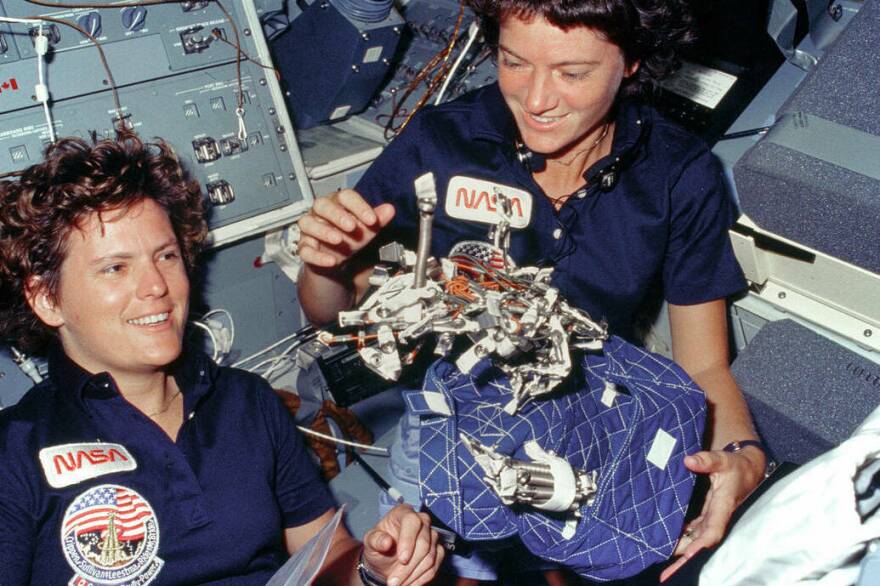The morning of June 18, 1983, hundreds of thousands of spectators awaited the Challenger space shuttle launch at Kennedy Space Center in Cape Canaveral, Fla.
Some people in the crowd wore T-shirts inscribed with the Mustang Sally lyrics "Ride Sally Ride" because one of the astronauts on board mission STS-7 was about to make history.
Women in space
Mission specialist Sally Ride and four other NASA crew members lifted off on a six-day mission that would orbit Earth and deploy communications satellites. At 32 years old, Ride was not only the youngest astronaut on board, she was also the first American woman in space.

The first woman to orbit the earth was 26-year old Soviet cosmonaut Valentina Tereshkova in 1963. In the 1970s, NASA began recruiting women for the space shuttle program.
In 1977, NASA partnered with actress Nichelle Nichols, known for her role as Lieutenant Nyota Uhura on Star Trek. To aide the recruitment efforts of women and minority applicants, the agency released a video starring Nichols and astronaut Alan Bean.
NASA also took out advertisements in college and university student newspapers. During a guest lecture at UC Berkeley in 2011, Ride recalled seeing one of these ads in The Stanford Daily student newspaper while she was finishing her doctorate program at the university.
"And the moment I saw that ad," she said, "I knew that's what I wanted to do. I ripped it out of the newspaper and I literally applied that afternoon."
Out of over 8,000 applicants, Ride was one of 35 people selected for NASA's astronaut corps.
While at NASA, Ride helped develop a robot arm for the shuttle, the remote manipulator system. She also served as CapCom, the go-to communicator between Mission Control and astronauts in space.
In 1982, NASA announced that Ride would be the first American woman to go to space.
After completing that historic spaceflight in 1983, Ride spoke with journalist Gloria Steinem, remembering that the press seemed more concerned about her gender than the mission.
"Everybody wanted to know about what kind of makeup I was taking up," Ride said. "They didn't care about how well-prepared I was to operate the arm or deploy communications satellites."
In 1984, Ride went to space again for NASA mission STS-41G. This time, another female astronaut, Kathryn Sullivan, was on board the shuttle with her. This was the first time two women were in space together, and Sullivan became the first American woman to perform a spacewalk.

Ride after NASA
Ride was scheduled to return to space a third time. But her mission was cancelled after the Challenger shuttle explosion in 1986.
She joined the presidential commission investigating the disaster.
"I think it's very important that we try and rebuild the NASA — I don't want to say image because that sounds a little bit superficial — but really get back to basics at NASA and get back to what people expect us to be," Ride told NPR's Morning Edition later that year.
Ride left NASA in 1987. She became a physics professor at UC San Diego and wrote books about space for students and teachers. Ride continued to encourage children, especially young girls, in science and mathematics.
On July 23, 2012, Ride died at her home in California. She was 61 years old.
Nearly a decade after Ride's passing, her life partner, Tam O'Shaughnessy, spoke to NPR's Short Wave.
"You know, I almost have a picture of Sally in my mind, standing in our living room in La Jolla," O'Shaughnessy said. "And she's got on, you know, like, an old T-shirt that's kind of pulled over to one side. Her hair is kind of combed but kind of wild, you know, a pair of shorts and barefoot. She loved going barefoot. ... I loved looking at her when she was, you know, like that, when she wasn't intense and working hard. ... I loved that, you know, that she could be there with me in each moment."
Forty years ago, Sally Ride became the first American woman in space.
This story is part of a special series where NPR looks back at our coverage of major news stories in the past. Listen to the full audio story to hear NPR's archival audio, or find other stories in this series:
- 50 years ago, U.S. astronauts landed on the moon. None have been back since
- Remembering Olympic gold medalist Florence 'Flo-Jo' Griffith Joyner
- 50 years ago, the first cellphone call was made
Copyright 2023 NPR. To see more, visit https://www.npr.org.



